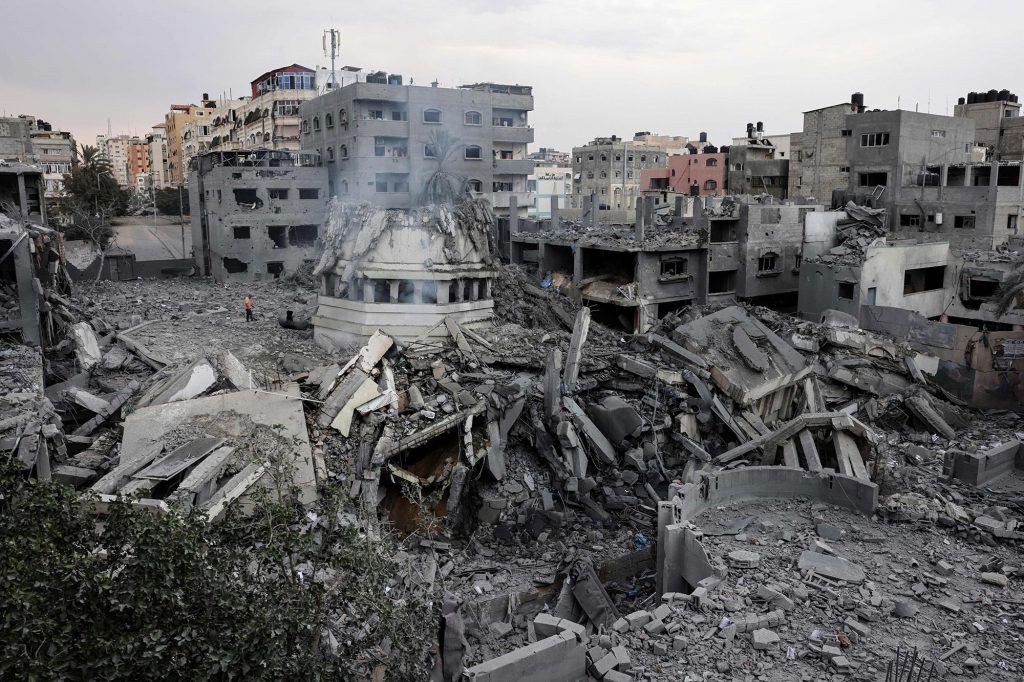On Thursday, Israeli troops murdered more than 100 desperate Palestinians attempting to access a convoy of food aid in northern Gaza. The horrendous massacre — yet another moment in Israel’s ongoing genocide against the people of Gaza — was quickly reported by news outlets across the world, complicating attempts by the Biden administration to broker a cease-fire and a temporary end to Israel’s bloody assault. In response, President Biden was forced to walk back claims that an agreement could be reached by Monday. Now the administration is saying it hopes to have a plan in place before the beginning of Ramadan, the date set by Israel for a threatened ground invasion of Rafah, where more than one million Gazan refugees are pressed against the border with Egypt.
But those negotiations are not going well. Even before the massacre, senior Hamas officials had indicated that they had not received any official truce proposal and that there was still a long way to go before an agreement could be reached. As Basem Naim, the head of political and international relations for Hamas, told Al Jazeera, “The gap is still wide. We have to discuss a lot of points with the mediators.” Hamas has argued that any agreement must include a permanent cease-fire and the withdrawal of all Israeli troops from Gaza, a demand that the White House and Israel seem unwilling to even consider.
Faced with rising opposition to the genocide and increased calls for a cease-fire at home, not to mention plummeting approval ratings, Biden is desperate to broker some kind of a deal. But his priority, as it has been all along, is to continue to defend and support Israel however he can. This is why the Biden administration has vetoed not one, but three different cease-fire proposals and has continued to provide financial and military aid to Israel. It’s therefore unsurprising that instead of a permanent cease-fire and withdrawal of Israeli troops, the president is pushing for yet another “temporary cease-fire” of six weeks and an exchange of hostages, similar to the momentary truce that was negotiated in November. Israel broke that first truce in a matter of days, and the death toll since then has almost doubled. Meanwhile, thanks to Israel’s ongoing siege, hunger and starvation have spread across the enclave. The White House claims that a temporary cease-fire could lay the foundation for a permanent peace, but it’s clear that Israel has no intentions of ending its siege on Gaza or withdrawing troops, and that the U.S. has no intention of forcing them to do so. Instead, all indications suggest that Israel plans to occupy Gaza indefinitely. Under these circumstances, any cease-fire, without the withdrawal of the IDF, even if it did lead to a decrease in hostilities, would only cement Israel’s occupation and allow Biden to sell himself as a peacemaker.
Of course, these negotiations are not happening in a vacuum. Biden and Israel have both faced mounting pressure from states, international institutions, and a global movement for Palestine, which has helped shift public opinion in favor of a cease-fire. In fact, the call for a cease-fire, which began as a progressive demand of the Pro-Palestine movement, has now become practically hegemonic. Australia, Canada, and New Zealand have all called for a “humanitarian cease-fire,” as have more than 70 U.S. city councils, including San Francisco, Minneapolis, and Detroit. Dozens of major unions, including the UAW and the massive AFL-CIO, have also come out in support of a cease-fire. Meanwhile, nonprofit groups and political organizations such as Our Revolution and Listen to Michigan, with the support of Democratic Party politicians, including former representative Andy Levin and Palestinian representative Rashida Tlaib, organized a “vote uncommitted” campaign in Michigan to pressure the president to change his policy on the war on Gaza and to commit to a cease-fire. That campaign won more than 100,000 uncommitted primary votes, enough to demonstrate that Biden could lose Michigan in 2024 because of his support for genocide in Gaza. But this campaign, which offers little more than an abstract criticism of the president’s support for Israel, does not specify what a cease-fire should look like and thus creates an opening for Biden’s rehabilitation.
In fact, it’s increasingly clear that the Democratic Party, and what Antonio Gramsci called the institutions of the “integral state,” — including labor unions and nonprofit organizations — are hoping to use the “vote uncommitted” campaign and the broader demand for a cease-fire to drive people back to the Democratic Party. The UAW, for instance, may have called for a cease-fire, but that did not stop it from endorsing “Genocide Joe,” thereby channeling workers’ anger over Gaza off the streets and into the electoral arena. Indeed, despite calling for a cease-fire, the UAW leadership has so far failed to organize any work actions or demonstrations related to the demand or to mobilize its members to join the movement for Palestine in the streets. Negotiating a cease-fire before Ramadan, then, could be used to paint Biden as a candidate who cares about his constituents’ concerns and can be moved on important issues. Even the so-called Left of the party, including DSA member Alexandria Ocasio-Cortez, who has been calling for a cease-fire for months, is pushing to help save Biden’s image. Rather than criticize the president for supporting the genocide, Ocasio-Cortez and other Democrats are encouraging him to call for a cease-fire in his State of the Union address on Thursday, a symbolic gesture designed to shore up his falling approval ratings, particularly among Black, Arab, and young voters, who are most critical of his support for Israel and who have threatened to stay home on Election Day.
Though any cessation of Israeli hostilities would be a positive development for the Palestinians under siege in Gaza, a six week cease-fire is quite obviously insufficient.
First, it is much too little, much too late. After five devastating months of siege, bombing, massacres, displacement, hunger, and now starvation, Israel has inflicted a devastating wound on the inhabitants of Gaza. And it has done this all with the willing support of the U.S. establishment: from the president and the entire Democratic Party, on down to UAW leader Shawn Fain and other union bureaucrats who have failed to even denounce Israel’s actions as a genocide. The UAW bureaucracy, in fact, has quashed several attempts by local chapters to pass resolutions asking the union to call for an end to military aid to Israel. Thanks to this support, whether there is a cease-fire or not, Israel is now primed to invade Rafah if it so wishes, and to permanently occupy and perhaps settle large portions of the now largely depopulated northern parts of the enclave. A cease-fire without the full withdrawal of Israeli troops, though it may help Gazans in the short term, will only allow Israel more time to shore up those gains, defend itself against its enemies, and prepare to further oppress the Palestinians of Gaza.
Second, the demand for a cease-fire, grounded as it is in the idea that state institutions and bourgeois politicians can be swayed to act in the interests of oppressed peoples, obfuscates the importance of class independence and working-class struggle, without which true liberation for the people of Palestine is impossible. While political pressure has forced Biden to advocate a cease-fire, it has done nothing to fundamentally weaken Israel militarily and has had little material effect on its relationship with the United States. Indeed, it was only a little more than a week ago that Biden yet again proudly called himself a Zionist on national television, even as he vowed to deliver a cease-fire. That cognitive dissonance, on display for the world to see, is not a bug but a feature of the U.S. imperialist regime, which sells itself as a peacemaker even as it perpetrates and supports violence against some of the most oppressed peoples on the planet.
Clearly, we cannot expect the U.S. to willfully stop supporting its strongest ally in the Middle East. If we wish to fight for more than a cease-fire; if we wish to fight for the liberation of Palestine and all oppressed peoples across the world; if we want the movement to grow rather than shrivel and die as the occupation again fades into the background — we will have to fight for more and do it with working-class methods of struggle. This means expanding the protests in support of Palestine by forcing labor to break with the Democratic Party and stand with the movement in the universities and on the streets. It also means learning again how to use the strike weapon and militant actions in our workplaces, such as blockades of weapons shipments, to demand the total withdrawal of Israeli forces from all Palestinian territories, beginning with Gaza, and the immediate end of all military and financial aid to Israel.
Ultimately, we must be clear that any cease-fire is insufficient if it does not include the immediate and permanent withdrawal of all Israeli troops and an end to the siege on Gaza. And when it comes to Palestine, our horizon has to be the military defeat of Israel as an appendage of U.S. imperialism in the Middle East, and the creation of a single socialist state (part of a socialist Middle East) where Arabs and Jews can live together. Anything less will only allow the genocide to continue.











